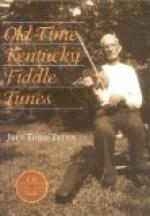He noted with amazement the great force of the infernal power the burning fuses loosed, and knew, instinctively, that the explosive was a stronger one than that with which he had been thoroughly familiar since his earliest childhood—gunpowder. He wondered mightily what it could be, and, finally, summoned courage to inquire of one of the swart laborers.
These were the first words he had spoken that day, and, although the man was courteous enough in answering, “Dynamite,” he thought he saw a smile upon his face of veiled derision, and resented it so fiercely that instead of thanking him he gave him a black look and sauntered off. But he had learned what the explosive was; before he went away he had seen it used in half-a-dozen ways and had a visual demonstration of the necessity for caution in its handling. One of the young and cocky engineers, whom he so hated, dropped by dread mischance a heavy hammer on a stick of it, and the resulting turmoil left him lying torn and mangled on the rocks.
Lorey felt small sympathy for the man’s suffering, although he never had seen any human being mutilated thus before. Many a man he had seen lying with a clean hole through his forehead, the neat work of a definitely aimed bullet; assassination and the spectacles it carried with it could not worry him: his childhood and young manhood had been passed where “killings” were too frequent; the man, like all the others there at work, was his enemy, and he sorrowed for him not at all; but this tearing, mangling laceration of human flesh and bone was horrifying to him.
Later, though, a certain comfort came to him from it. The whole scene had impressed him and depressed him. He remembered what Madge Brierly had said about the engineers with their blue paper plans and their ability to read from them and work by them. He saw them at their work, and the spectacle made him feel inferior, which had never happened in his free, untrammeled life of mountain independence before. There were a dozen men about the work of the same type as Layson’s, and their calm cocksureness as they directed all these mysteries amazed him, overwhelmed him, made him feel a sense of littleness and unimportance which was maddening. Why should they know all these things when he, Joe Lorey, who had lived a decent life according to his lights, had labored with his muscles as theirs could not labor if they tried to force them to, had lived upon rough fare and in rough places while they had had such “fancinesses” as he saw spread before them at their mess-tent dinner (and crude fare enough it seemed to them, no doubt) knew none of them? He could see no justice in such matters and resented them with bitter heart. If their own infernal powder had killed one of them he would not mourn. He tried to look back at the accident with satisfaction.




